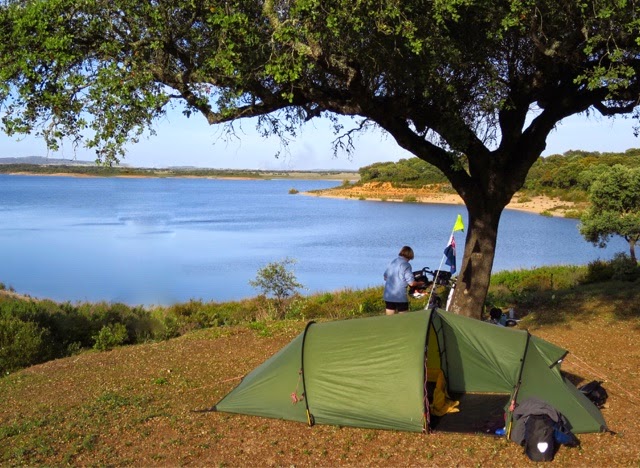In the square, six old men commanded a park bench each. They ignored us - not even an eyelid flickered.
We dismounted and I tethered the Beast of Burden alongside a whitewashed wall.
Suddenly, a flurry of movement. A man sitting outside a tiny bar nodded in our direction. "Boa tarde", we murmured in reply. He had a companion. It was a man with a long cane which he tapped incessantly on the ground. Maybe he was blind. Maybe he wasn't.
"Those trees are wearing jackets", Judy said. She was right. Weird. She took the camera and wandered over to the square, the six old men day dreaming of times past and the trees with jackets.
She came back. "They're crocheted or knitted or something. Why would anyone do that?"
We peered into the bar hoping for coffee but it was too dark inside to see. There was a cafe a few metres further on. The outdoor seats were in the hot sun, but the breeze on the bike had been cool. We were served bread and what may have been pork crackling, along with our coffee galão. It was good.
The husband served us, but it wasn't long before his wife came outside to study the strangers with the strange bike. We tried to converse but it was hopeless.
We left town none the wiser about the colourful jackets, but who cares? The cycling was brilliant.
For three days we have pedalled east across the Alentejo - the central soul of Portugal. Gentle, rolling countryside with scrubland has given way to our first cork trees - at times stretching as far as the eye can see, then wheat, olives and a few cattle.
Our first cork trees. The Alentejo region provides half the world's cork, but demand is falling as winemakers move away for cork stoppers in favour of screw caps.
There has been little traffic, and a couple of campgrounds right when we needed them, one beside a man made lake at Barragem de Odivelas. That night we watched the light fade as a long way across the water, the lights of the village of Torrao came on.
Now we are in Beja, the main town of the Baixa (Lower) Alentejo and it is 25th April - a national holiday to celebrate the 1974 revolution.
Getting a handle on the political changes since then has not been easy. Perhaps the most interesting conversation was with a middle aged woman in the Tourist Information Office here. "The Communists still have influence here in Alentejo," she said. "And they like to claim April 25th as their own. But it's not. It belongs to all Portuguese people."
She would not be celebrating, she said. She was a democrat and she believed in free elections. But the dictator Salazar was not all bad - though certainly the repression under his regime was wrong.
Now Portugal was suffering for its membership of the EU - having to pay back loans for all the money it had borrowed. And under the old regime, there were people willing to work in the fields. Now everyone had university degrees and people came from Romania to harvest the crops.
Our conversation was interrupted by others seeking information.
"This is just my view," she said as she turned away.
This afternoon we stumbled across a band practice. Vozes do Alentejo were on stage readying for a performance to mark 25th April. We couldn't understand a word, but they sang in beautiful harmony and we were moved by what felt like songs of longing.
Up in that hilltop town, those old men may have been lost in the past. But here the voices were full of sorrow and joy and hope for the future.








Great blog - lovely countryside and no stress!
ReplyDelete